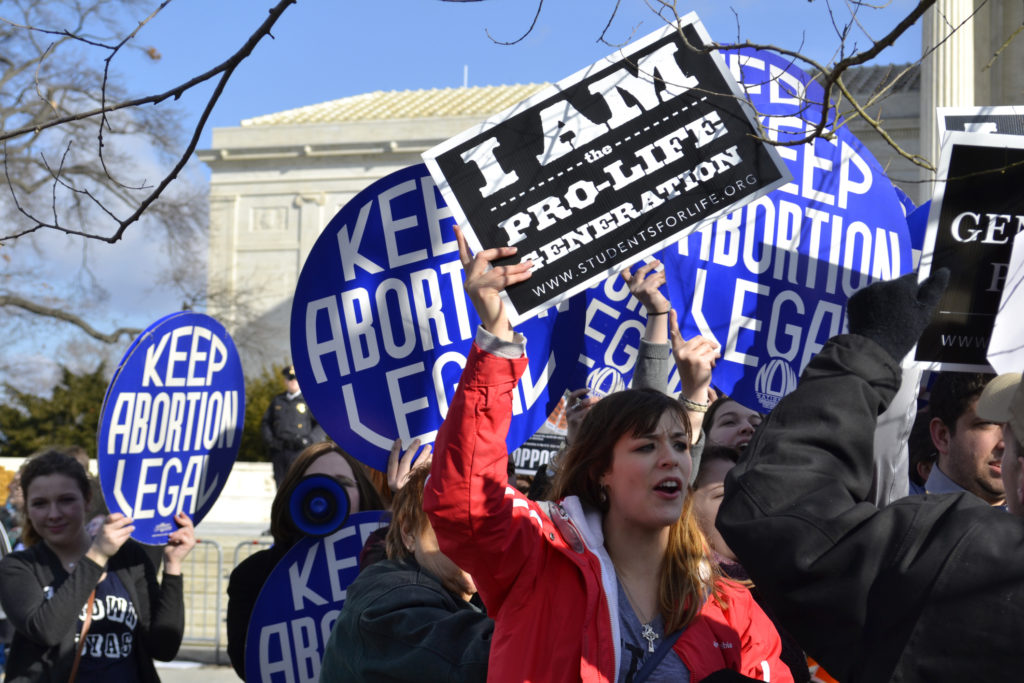
WASHINGTON (BP) – An effort by congressional Democrats to enshrine an unprecedented abortion right in federal law failed Monday (Feb. 28).
The Senate refused to consider the Women’s Health Protection Act (WHPA), voting 48-46 against invoking cloture. All the Republicans who were present – as well as a single Democrat, Sen. Joe Manchin of West Virginia – opposed the procedural move, which required 60 votes to cut off debate so a vote on the bill could occur. The House of Representatives had already approved the legislation, and President Biden had endorsed it.
The attempt by Democrats in Congress to expand abortion rights came as the Supreme Court considers a case that could result in the reversal of its 1973 Roe v. Wade decision that legalized abortion nationwide. The WHPA would go beyond the Roe opinion, however, by prohibiting federal and state regulations of the procedure that are now permitted by the high court.
Southern Baptist public-policy specialist Chelsea Sobolik decried the bill and the Senate’s timing in acting on it.
“It is unconscionable that the U.S. Senate would bring the fallaciously named ‘Women’s Health Protection Act’ to the floor today, in the midst of the cruel, illegal invasion underway in Ukraine,” said Sobolik, director of public policy for the Ethics & Religious Liberty Commission (ERLC), in written comments.
“Senators should be focused on protecting life, not ending preborn lives by bringing one of the most extreme abortion bills in history to the Senate floor,” she said. “Divisive and partisan bills are not what America needs in this moment.”
Sen. James Lankford, R-Okla., a Southern Baptist, also criticized a vote on the bill the day the Senate reconvened after a week out of session.
“[M]y Democrat colleagues decided not to talk about Ukraine when we got back together, but instead they want to talk about expanding abortion in America,” Lankford said on the Senate floor before the vote. “How incredibly tone-deaf is that? The whole world is talking about Ukraine and the oppression they’re experiencing, and the United States Senate is talking about how do we get more abortions in America.”
Other pro-life advocates welcomed the failure of the proposal.
The bill “would have endangered women and unborn babies by prohibiting most – if not all – of the reasonable state regulations on abortion currently in place,” said Denise Burke, senior counsel for Alliance Defending Freedom, in a written statement. “This legislation was just the latest example of the extreme lengths to which congressional Democrats will go to cater to abortionists.”
The WHPA would nullify, according to the National Right to Life Committee (NRLC), such state, pro-life regulations as:
- A waiting period for a woman before an abortion;
- Information for a woman considering abortion regarding her unborn child and alternatives to the procedure;
- A ban on sex-selection abortion;
- A prohibition on abortion after 20 weeks based on evidence the child feels pain by that point.
The legislation also would rescind most federal restrictions on abortion, as well as conscience protections for health-care workers and most, or maybe all, bans on government funding of the procedure, NRLC reported.
The Supreme Court is expected to rule by June or early July on a Mississippi law that prohibits abortion after 15 weeks’ gestation. Following the high court’s December oral arguments in the case, many pro-life and abortion-rights advocates believe the justices are likely not only to uphold the ban but to overturn the Roe ruling and the 1992 Planned Parenthood v. Casey opinion that affirmed that decision but permitted some state regulation of abortion. Such a reversal by the Supreme Court would return abortion policy to the states.
In briefs before the oral arguments, Mississippi and many pro-life organizations, including the ERLC, asked the high court to reverse both the Roe and Casey opinions.
The ERLC posted Tuesday (March 1) an array of resources on its website explaining the Mississippi case, Dobbs v. Jackson Women’s Health Organization, and its potential effect. The resources, which can be accessed here, include a prayer guide.
In bringing the WHPA to the floor for a vote, Senate Majority Leader Charles Schumer, D-N.Y., told the chamber Monday this “is a dark, dark time for reproductive rights. So the Senate today is going to take action because abortion has never been more at risk in America.”
Though they voted against consideration of the WHPA, Republican Sens. Susan Collins of Maine and Lisa Murkowski of Alaska introduced legislation Monday to codify the right to abortion established by Roe and endorsed by Casey.
In September, the House of Representatives approved the WHPA, 218-211. All House Republicans, joined by Democrat Rep. Henry Cueller of Texas, voted against the measure. Biden strongly endorsed the proposal before the House vote.
















